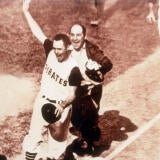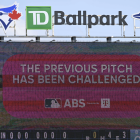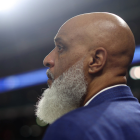
Did David Wright's career-ending injuries wreck his shot at the Hall of Fame? Making a case for the Mets great
Wright was on track through his age-30 season before injuries ended his career

Up next in my series of Hall of Fame profiles (after Top 10 storylines, Adrián Beltré, Joe Mauer and Chase Utley) is David Wright. A man who once upon a time was one of baseball's best and most marketable players, to the point that he was dubbed Captain America in front of the World Baseball Classic, Wright looked like a Hall of Famer for several years.
I also think the entire case ends up falling short of induction into the Hall. We can probably loop him in with another famous New York corner infielder who was cut down far too early due to back injuries: Don Mattingly. As I noted toward the end of my writeup on Utley, I generally enter these articles with an idea of where I'll end up on a player and sometimes during the course of working them up, I change my mind.
My initial gut feeling is that Wright is not a Hall of Famer. Let's see if that changes, shall we?
A sandwich round pick (between the first and second; 38th overall) in 2001 out of Hickory High School in Virginia, he was a top-75 prospect by spring training in 2003 and up to No. 21, per Baseball America, before the 2004 season. He would debut with a nice rookie season, hitting .293/.332/.525 (119 OPS+) in 69 games with 17 doubles, 14 homers, 40 RBI and 41 runs. He was also 6 for 6 in stolen bases and played great defense at third. There was every reason for the Mets to believe they had a future superstar on their hands.
They did.
Wright began a stretch in 2005 where he was either an All-Star or got MVP votes in eight of the next nine seasons (both happened five times, with Wright topping out at fourth in MVP voting in 2007).
He was durable, too, at least to start his career. He played in 160, 154, 160 and 160 games, respectively, in his first four full seasons. A concussion dropped him down to 144 in 2009, but he was back up to 157 in 2010. In 2011, a stress fracture in his back held him to 102 games and little did we all know what "back injury" would mean for Wright moving forward. He bounced back to 156 games in 2012, but then hamstring issues started to hamper him before spinal stenosis ruined the rest of his career (it was diagnosed in 2015, when he was 32 years old).
Through age 30, Wright had a partial Hall of Fame resume. That is to say that he had a great foundation and was well on his way. Among his top 10 statistical similar players through age 30, for example, are Scott Rolen (No. 1), Freddie Freeman, Chipper Jones, George Brett and Mookie Betts. Now, across a complete career, the most similar statistical players, among those retired, are Ken Caminiti, Hanley Ramirez, Mike Lowell, Matt Kemp and Travis Fryman. Good players, all, but not Hall of Famers.
In that time frame, Wright hit .301/.382/.506 (137 OPS+) with 162-game averages of 184 hits, 41 doubles, 26 homers, 103 RBI, 101 runs, 22 steals and 5.1 WAR. Again, that's a Hall of Fame pace assuming a long career. At that point, a player needs to just keep compiling to get home. The injuries cost Wright that chance.
He ended up a career .296/.376/.491 hitter, which was good for a 133 OPS+. He collected 1,777 hits, 390 doubles, 26 triples, 242 home runs, 970 RBI, 949 runs and 196 stolen bases.
If you're looking for a third baseman in the Hall of Fame with fewer than 2,000 hits, 1,000 RBI and 1,000 runs, you'll only find special cases (Negro Leaguers with incomplete stat ledgers or John McGraw, who was a Hall of Fame manager) and/or extreme throwbacks (Freddie Lindstrom, Home Run Baker). Among contemporaries, or anyone close to a similar era, even non-Hall players like Fryman and Ryan Zimmerman got over 1,000 RBI. Matt Williams and Ron Cey surpassed 1,000 RBI with ease. Todd Zeile topped 2,000 hits and 1,000 RBI. Bobby Bonilla was over all three benchmarks.
Arbitrary endpoints, sure, but that's about all we have to go on when trying to create a statistical case.
Among third basemen, Wright ranks 49th in hits, 44th in runs, 21st in doubles, tied for 34th in homers (with Kyle Seager) and 42nd in doubles.
To overcome those rankings, the peak and/or rate stats need to be off-the-charts compelling. Wright had a great peak, but he never finished top three in MVP voting and was only top five once. He had an 8.3 WAR once (which is MVP-caliber), followed by seasons with 7.1, 6.9 and then 5.2. Yes, he only had four 5+ WAR seasons. He only had six 4+ WAR seasons.
It just isn't enough to make a compelling Hall of Fame argument.
If we weren't already operating in this reality, the career WAR and JAWS figures illustrate as much. In WAR, Wright ranks 28th among third basemen, sitting in the ballpark of Toby Harrah, Bob Elliot, Heinie Groh and Larry Gardner. He's a bit below Cey and Robin Ventura while a bit above Josh Donaldson and Matt Williams.
JAWS meshes WAR with WAR7 (the top seven WAR seasons) to account for peak candidates like Wright, so he should fare better there. He does, but only slightly. He's 26th, neck and neck with Donaldson. He trails the likes of Darrell Evans, Ventura, Stan Hack and Cey. Third base was long under-represented in the Hall of Fame, but there's been a little headway made in recent years, plus, Beltré is overwhelmingly likely to get in this year. Active players like Evan Longoria, Nolan Arenado and Manny Machado rank ahead of Wright in JAWS. It's also possible that we'll see more run for players like Graig Nettles (12th in JAWS), Ken Boyer (14th), Buddy Bell (15th), Sal Bando (16th) and/or Dick Allen (17th) in future Era Committee votes, too.
I mentioned special cases up above and maybe if Wright had something like three World Series MVPs we could give him enough of a bonus to justify throwing him some votes and trying to keep him around on the ballot. Alas, he doesn't. He played in two different playoffs and made the World Series in 2015, hitting .198/.311/.319 in 24 postseason games, but he and the Mets came up empty.
Wright was such a fun player before his back crushed his career. He's an incredibly likable guy and was on a Hall of Fame track before injuries derailed him. At the end of the day, though, there's only so much we can do with that stuff when looking to uphold the standard of what a Hall of Famer's complete playing resume should feature. Like Mattingly before him, Wright falls short.


















